How to win Bonaparte. Part of 1. Saint-Jean d'Acres, 1799 year
In the East, Bonaparte had to face unusual opponents - these were not only semi-regular, albeit numerous land armies, but also well-trained, well-supplied British squadrons. The commander of one of them, the enterprising Sir William Sydney Smith, the savior of Acre, and became the actual gravedigger of the French expeditionary army.

The defeat at the walls of Saint-Jean d'Acres was the first in the career of Napoleon Bonaparte. Even soon defeating the Turkish army with Commodore Smith himself, the great commander did not seem to have gotten rid of the original Acre complex. Then he always tried to avoid a siege of fortresses, preferring at best to entrust it to his marshals. And to Sydney Smith in his memoirs and notes, Napoleon devoted perhaps the most caustic comments among all who managed to deprive him of the laurels of the winner.
In the autumn of 1797, after five years of continuous wars, the Directory expected to improve its unstable position due to another victory. England remained the last undefeated enemy of the Republic. After the peace in Campo-Formio, which was actually presented to her by General Bonaparte, I wanted to strike the main enemy right in the heart. At the suggestion of the energetic Barras, the director was worn with the idea of landing on the banks of the Thames, or at least in Ireland.
The first attempt made in December 1796, was unsuccessful. The squadron with 15-thousand troops under the command of Lazar Gosh swept the storm on the way to the Irish coast. Gosh was replaced by Pears, whom everyone considers to be the culprit for the defeat at Waterloo, but he failed to land. Now that which failed Gosha and Pears, had to perform a new hero. October 26 The 1797 of the year General Bonaparte, who had not yet had time to return to France, was appointed commander of the so-called British Army. She was meant to make another attempt to invade the British Isles.
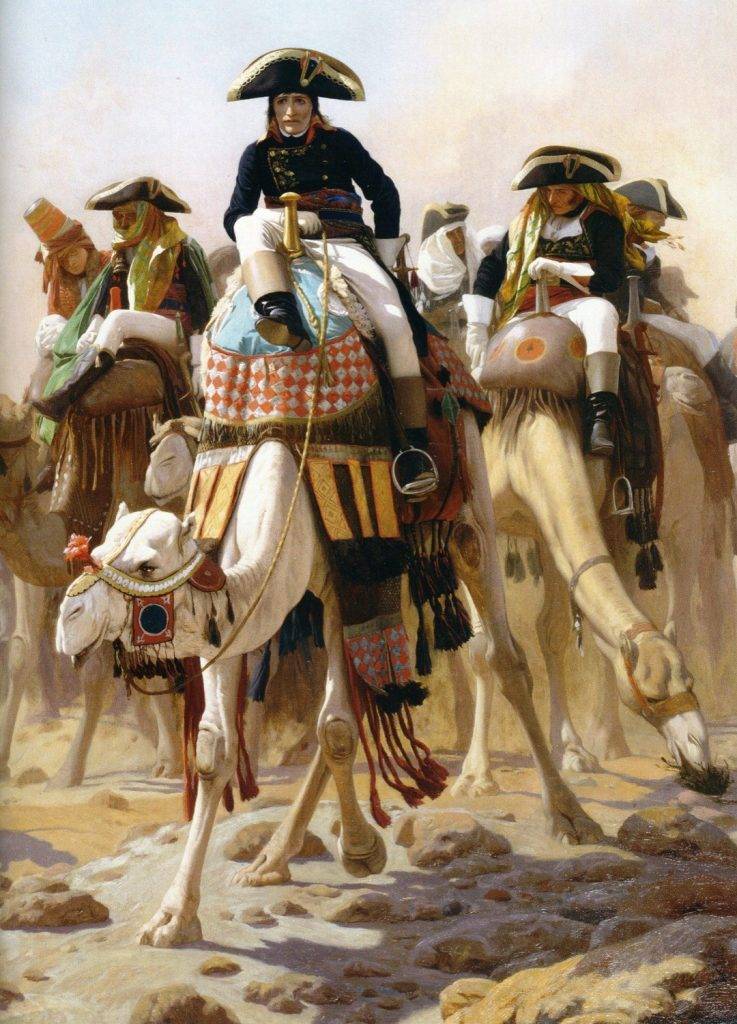
But Bonaparte, obviously, was not too attracted by the prospect of fighting without any special chances of success on the misty shores of Albion. Having made an inspection trip to the west coast of France, the general concluded that "this is an enterprise where everything depends on luck, on occasion." The general did not even think to hide his opinion: “I will not undertake in such circumstances to risk the fate of beautiful France,” and suggested that the Directory should strike in England elsewhere - in Egypt.
According to the young commander, here, on the Nile, the UK was more vulnerable than in the metropolis. By the way, as early as August 1797, General Bonaparte, who had just settled in Venice, wrote to Paris: “The time is not far off when we feel that in order to actually defeat England, we need to master Egypt.”
Directory for a long time did not have to convince. The restless and won by the enviable popularity of the general should not have lingered too long in Paris. The British expedition had very dubious chances for success, and another failure could have hit not only Bonaparte’s personal prestige, but also the Directory itself. And from an economic point of view, the mastery of Egypt promised something more than the support of the Irish rebels.
Already on March 5, a political decision was made: Bonaparte received an army in command, which was preparing for a rapid breakthrough to the east, but in order to mislead the British, it retained the name of the English. Contrary to expectations, the preparation of a unique expedition did not drag on, the organizational talent of the young general allowed him to manage in just two and a half months. The commander not only independently selected personnel, sometimes up to rank and file, but also was engaged in the procurement of ammunition and food, and even personally inspected numerous vessels flotilla.
The British, using an extensive network of agents and the help of royalists, quickly got exhaustive information that a strong expeditionary force was preparing in Toulon. However, in London, all the rumors that the French are preparing to disembark at the mouth of the Nile, without a shadow of a doubt, were regarded as grand disinformation. Moreover, by the order of General Bonaparte, his agents sang Irish songs in the port taverns of Toulon and publicly talked about the prospects of landing on a rebellious island. Even Admiral Nelson, who tried to intercept the French from Gibraltar, fell for the trick of the French commander-in-chief.
A flotilla with Bonaparte's army, sailing 19 May 1798 of the year from Toulon, rushed to the East. The first stop is in three weeks from Malta. After spending only ten days on the occupation of the island, which belonged to the Order of the Knights of Malta since the 16th century, the general ordered the squadron to continue on its way. In Malta, the 4-thousandth unit of General Vobois remained.
Nelson, after receiving the dispatch about the fall of Malta, hurried to Egypt. In full sail the English squadron arrived near Alexandria, but somewhere in the Mediterranean Sea, it slipped past the French. In Egypt, they were not even suspected of their approach, and Nelson decided that Bonaparte’s ships were most likely heading for Constantinople. In the end, when 1 July, the French fleet appeared on the roads of Alexandria in the Gulf of Marabut, there was simply no one to meet him. Bonaparte ordered the troops to disembark, and as early as one in the morning on 2 July, the last of the French soldiers set foot on solid ground.
Alexandria surrendered after just a few hours of gunfire. A short throw to Cairo and the 21 victory overwhelmed the whole East of July at the Pyramids made General Bonaparte the owner of a huge country with a multi-million population and enormous wealth. However, difficulties in supplying the army with everything necessary, except perhaps for food, began almost immediately after the landing.
And on August 1, just ten days after the triumph of the Pyramids, a squadron of Bruyes arrived along with Bonaparte’s army and suffered a real disaster. Rear Admiral Nelson, despite the fact that the French were waiting for him from day to day, managed to suddenly attack them in the bay of Aboukir. After a brief battle, the French flotilla ceased to exist.
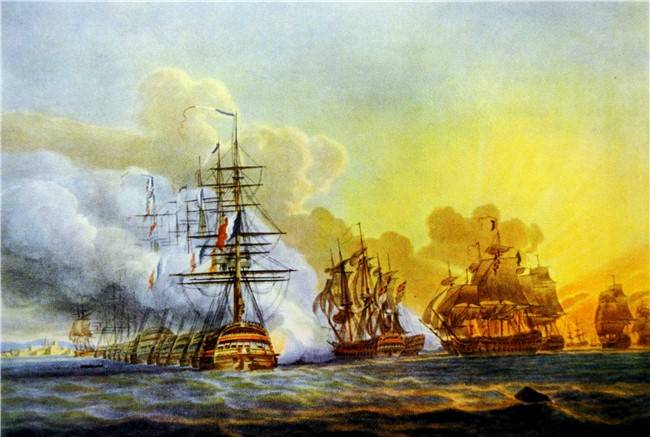
Bonaparte’s troops were effectively cut off from France for a long time. For the entire time of the march, only individual French transport ships managed to break through to the British in the blockade of Egypt. Nevertheless, so far there has been no question of any resistance to French rule in the Middle East. General Kleber fully captured the Nile Delta, and Deze successfully pursued Murad Bey in Upper Egypt.
By establishing a peaceful life in Egypt, the commander-in-chief was trying with all his might to build diplomatic bridges with the Ottoman Empire. But unsuccessfully. Become the new masters of the conquered country from the French, too, did not work. Uprisings flare up not only in Cairo, but in all parts of Egypt.
In the fall, under pressure from London, the Sultan's sofa declares war on Republican France. The troops of Seraskir Jezzar Pasha, as translated by his nickname "Butcher", obtained for the brutal massacre of the Bedouin uprising, were advanced to Syria. At the same time, another Turkish army, led by Mustafa Said, generously supplied from the ships of the English squadron, was preparing on the island of Rhodes for landing in Egypt. Receiving reports of this, Bonaparte, firmly following the rule to always strike first, decided to move to Syria.
Most striking is the scale of the plans of the 30-year-old general. Having at its disposal no more 30 of thousands of soldiers, the French commander is not limited to the assumption that he will be able to win over the large Christian population of Palestine. French researchers, led by a classic, Jean Toulard, believe that Bonaparte was "clearly not going to bury himself alive in Egypt." Is it really? Here at the walls of the unconquered Acre - for sure, but for now it is still seduced by a new light glory. And not only. The French continue to get a truly enormous booty, which would be nice to somehow send to their homeland. But for this you need only ... dictate peace - not only the Ottoman Empire, but also England. Approximately the way he did it with the Habsburgs in Campo Formio.
In addition, the young general, whose plans are truly worthy of Alexander the Great and Caesar, is ready to put together in battles in the East something like his own Praetorian Guard. Moreover, it is possible to recruit adherents into it both in Asia Minor and everywhere that its army will reach. As a true idealist, Bonaparte was hardly deceived by the prospect of becoming the vicar of the Empire in Syria and Palestine, like Pontius Pilate. Moreover, Republican France, as an empire, has so far been not very capable of competing with Britain. And if you really can’t hit the main rival right heart, then you need to beat in the stomach. In Egypt, and then - in India, because at the moment it is the strongest possible strike.
In the meantime, leaving half the forces on the banks of the Nile, Bonaparte violates his own rule - never crush your own forces and beat the enemy in pieces. With an army of all in 13 thousand people, he is ready to go to Constantinople. Where else, if not at its walls, dictate the terms of the world to both Sultan Selim III and the proud Albion? It was there that the Corsican could fulfill his fantastic dream of becoming the emperor of the East.
But the road to Constantinople lay through Palestine and Syria, specifically along the Mediterranean coast. And there the road of the victorious army was blocked by the main stronghold of the Turks - the fortress of Acre, ancient Akka or Akko, which the French called Saint Jean-d'Acr since the time of the Crusades. Unlike Jaffa, Acre was also the only port on the entire coast, suitable for large ships, and the possession of this port could provide the supply of the army. Taking Acre, it was possible to threaten communications with India, and turning to Damascus, move to join the rebels of Tippo Sahib, to whom the commander-in-chief sent a very characteristic letter.
Of course, there is no dispute over the “invincible” dispute, but it seems that seriously to count his army “innumerable” Bonaparte somewhere in Syria. To arm, train, and then you can choose - to go to the assault of Constantinople or to India. You can understand the general, because even in France, he made a choice in favor of Tippo Sahib, as an ally more reliable than the unpredictable Irish. However, a little later, Bonaparte had to realize that the calculation of the passion of the local population turned out to be fundamentally wrong. But recently, it was precisely among this population, by the way, that not only the Bedouins raised uprisings more than once.
The great Sinai desert, the French passed in just three weeks and February 27 captured Gaza. But then the setbacks began. Rainier's division, which, on the orders of the commander, was to build a fort in El Arish, unexpectedly stumbled upon there well-prepared defenses and a strong garrison of 600 Janissaries and 1700 Albanians. Only ten days later, with the approach of the main forces of Bonaparte, when General Dammarten set in motion siege artillery, the French broke the resistance of the defenders of El-Arish, who by then had only 900 remained. They surrendered on honorable terms and were immediately released on parole to never fight against the French.
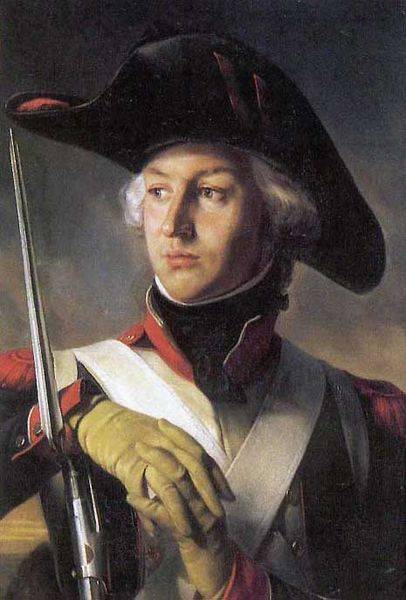
El-Arish Bonaparte received from General Junot, perhaps his closest friend, with whom he had always been with you, the unpleasant news of Josephine’s treason. Of course, this was not the cause of the delay at El Arish, but it cost Bonaparte dearly. English researcher David Chandler generally considers it fatal, which predetermined the outcome of the Acra confrontation.
The validity of such an assessment is highly doubtful, because if the ships of Commodore Smith had not intercepted a caravan with siege guns, she could have played into the hands of Bonaparte. Moreover, his soldiers managed to beat off a large train with provisions and ammunition from the Turks near Jaffa. The French continued their march into the interior of Palestine, and a new clash with the Turks took place at Jaffa. And then, a few days later, some of the defenders of El-Arish again fell into the hands of the French - already in the battles of Jaffa, for which they paid.
The massacre was extremely cruel - the prisoners were not only shot, many were beheaded by the executioner whom Bonaparte grabbed from Egypt, but someone, due to lack of bullets, was killed with bayonets or simply driven into the sea and drowned. Bonaparte later wrote that the war had never again seemed so disgusting to him, however, he justified his actions by saying that the prisoners had nothing to feed and could not let go, since they would again be in the ranks of the Turkish army.
The siege of Acre has been studied and described by historians down to the smallest details, so we confine ourselves to a brief summary of the story of events, paying more attention to the reasons for the failure of General Bonaparte. To the walls of Saint-Jean d'Acres, his army approached in mid-March. From here, the general self-confidently wrote to the elderly 78-year-old Turkish commander Jezzar Pasha:
“Since my arrival in Egypt, I have told you several times that I had no intention of waging a war with you; that my only goal was to expel the Mamluks ... The provinces of Gaza, Ramla and Jaffa are in my power; I generously treated those parts of your troops that surrendered to me at the mercy of the victor; I was harsh with those who violated the laws of war. In a few days I will move to Saint-Jean-d'Acres ...
What do some extra leagues mean compared to the length of the country that I have already conquered? And since God gives me victory, I want, by his example, to be gracious and merciful not only towards the people, but towards the nobility ... Become my friend again, be a foe of the Mamluks and the English, I will make you so much as much good as I did and can still do evil ... March 8 I will move to Saint-Jean-d'Acres, I need to get your answer before this day comes. "
General Bonaparte never received a response from Jezzar's “butcher” ... Speaking from Egypt, he ordered Rear Admiral Perret to deliver siege cannons on three frigates and two corvettes to the walls of the fortress, but he could only break through the blockade of Russian, English and Turkish ships 15 April. Another caravan of sixteen small ships with guns and combat crews left Damietta (now the capital of sweets, Dumiet) in the Nile Delta, but was intercepted by Commodore Smith's battleships Tigr and Tezey, which arrived in Acre in just two days to Bonaparte's troops.
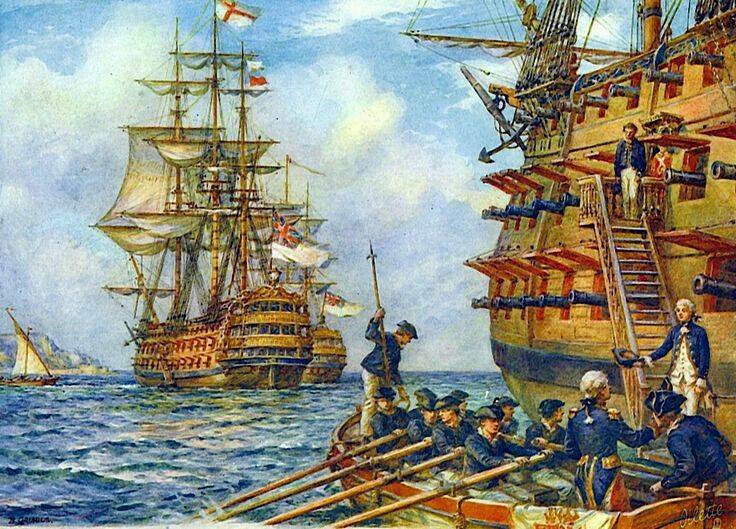
As a result, the French guns strengthened the defense of the fortress, which, according to the French commander, was the weakest along the coast. However, there all the fire in artillery from the English squadron. In principle, Acra was not much different from other old fortresses in Asia Minor. By comparison, Ishmael or the Warsaw bridgehead Prague, which successfully attacked Suvorov, were much better protected. It is hardly necessary to doubt that General Bonaparte was well aware of the successes of the old field marshal, and immediately decided to take Acre by storm.
Despite the fact that the first assault was very thoroughly prepared, it took 10 days for the French, it was not crowned with success. Many are inclined to believe that the failure was due to a whole chain of accidents, for example - with the help of a tunnel, only part of the main tower was blown up, but in fact the French simply did not have enough power. And clearly not enough siege cannons.
Bonaparte embarked on a systematic siege, but he understood that he could not count on a complete blockade of the fortress - the approaches from the sea were completely controlled by the British. Moreover, not only good fortune was on the side of the enemy, but also Commodore Sydney Smith, next to whom was the old opponent of Bonaparte, the talented engineer Le Picard de Filippo. A royalist and immigrant, he was still at war school with a little Corsican, and at one time helped Sydney Smith to escape from the Paris prison.
In Acre, Filippo became the chief assistant to the English Commodore, who in fact led both his squadron and the defense of the fortress. Not only did Filippo put up a countermining battle, he actually supervised artillery and fortification works, turning the old ruins of Acre into a quite suitable citadel for defense. On his orders, the defenders of the fortress secretly erected an internal line of defense, which helped disrupt the decisive assault on the French 7 in May. Filippo did not see the defeat of the French, he managed to die either from the plague, or from a sunstroke even before the French army lifted the siege and returned to Egypt.
Bonaparte left an epitaph about him, remarkable at least in that there is not a drop of hatred in it:
But Bonaparte was not helped even by the breakthrough of Admiral Perret through the enemy blockade. Siege mortars, which his ships brought to Jaffa on April 15, turned out to be at the walls of Acre on 27 and even participated in the decisive assault of May 7-8. General Bonaparte spent more than two months in Syria, organized several storming of the fortress, and during that time managed to crush the army at Tabor mountain, which went to the rescue of Acre. Jezzar Pasha twice got on the ship to leave the fortress, and his example was almost followed by the entire garrison and the inhabitants, but Acre nevertheless withstood.
The Turkish army of Pasha Mustafa-Said, who arrived from Rhodes, created the threat of losing Egypt, and Bonaparte had to lift the siege of Acre. The French, led by their general, did a truly monstrous backward march through the deserts of Palestine and Sinai, and the general walked with the soldiers almost all the way. They even managed to smash the 18-thousandth Turks landing, landed at Cape Aboukir, the very one where not so long ago Nelson sunk almost the entire French Mediterranean fleet.
In the ranks of the Turkish army he fought and managed to remain alive Commodore William Sydney Smith, the first winner of Bonaparte. A general with a handful of his closest associates soon went to France to carry out a coup d'etat and climb to the top of power.
In Syria, as if fate itself was against Bonaparte. Natural conditions, the almost complete inability to replenish resources on the spot, the population is not ready to fight either against the British or against the Turks, and finally, the main thing: the rupture of communications with France because of the complete domination of the enemy at sea. Against this background, if the general himself had any mistakes, they simply cannot be taken into account. Apparently, to win in France, he had to lose in Syria.
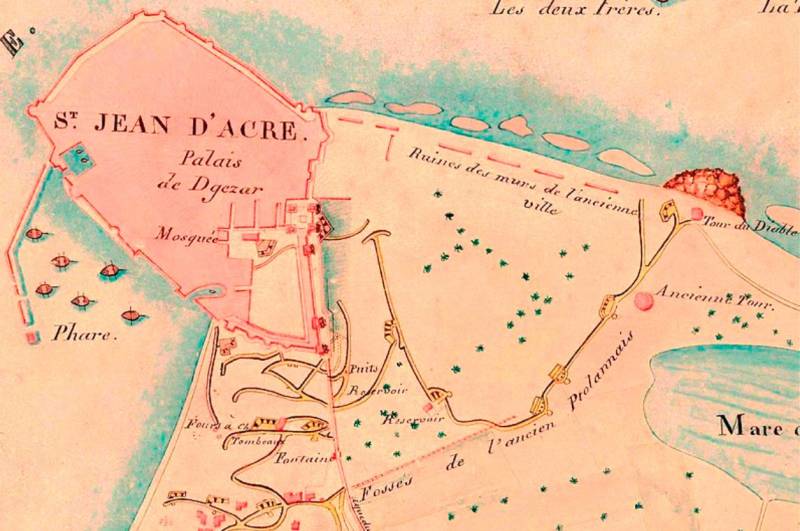
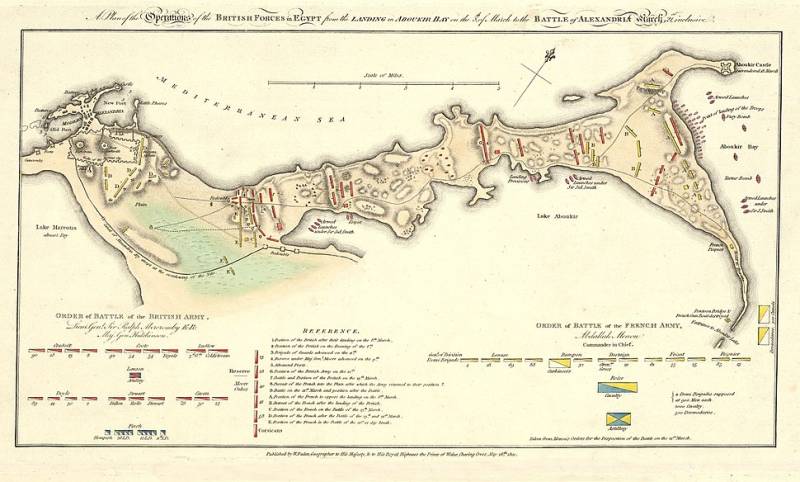
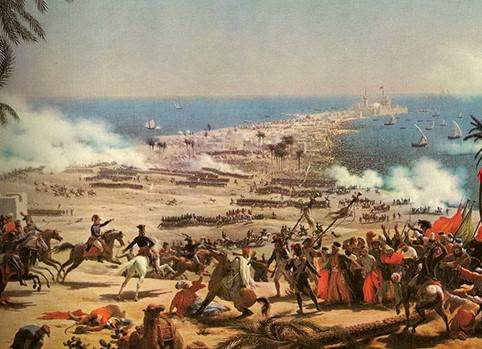
Information